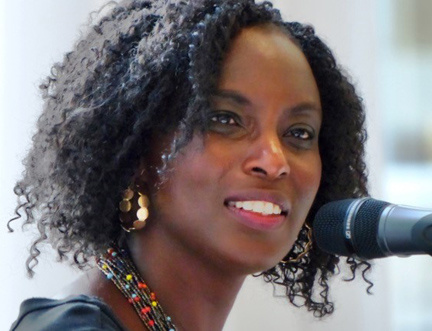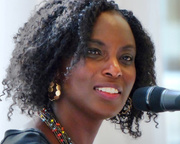The Freedom: Thumbnails
By Yvonne Owuor

In 2018, we commissioned 51 authors from 25 countries to write essays exploring ideas about freedom for The Freedom Papers, a publication produced in partnership with Gutter Magazine. Read on for Yvonne Owuor's essay, and visit guttermag.co.uk to purchase a copy of The Freedom Papers.
One evening in 2004, as part of a small rock art hunting crew, I trudged through an ancient landscape in Northern Kenya, trudging past petroglyphs and pictographs, those undeciphered messages from inhabitants past, intimidated by the land’s vast, feral, stark beauty that did nothing to calm my screaming awareness of my own ephemerality before the lavishness of existence. I happened to glance westward in the direction of the sunset. From a distance, a form shimmered, before it resolved itself into a woman, one from the mobile desert nations. It took more than a minute for her to glide past us. She was tall, slender, adorned with beads and copper wire, midnight dark of skin; furiously feminine. A chubby child was strapped to her right side, and an AK-47 was fastened to her left. Sheep, goats, a calf, and a lightly burdened donkey trailed in her wake. Her gaze was all encompassing. She did not stop. We did not call to her. We watched how the land seemed to open itself up to take her into itself. Among us, there was only silence. Oh, with every force in my heart, for an eternal minute, and in between time, I ached to be her. I ached to inhabit my perception of her visceral freedom, that unfettered being, that rootedness to the earth. To be able to move in and with the world, and claim a square mile of my choosing as home, and then to let that go and move again. She entered my life as a placeholder in the character that became Akai Lokorijom in the story that became the novel Dust.
‘She flows like magma, every movement considered, as if it has come from the root of the world… she is made of and coloured by the earth itself.’ (ibid., 33)
Ever since then, whenever the word ‘Freedom’ is raised, it is this woman of the country I would claim as my own, who traverses my imagination.
Freedom! It is as if ‘freedom’ is inscribed in human DNA. As if it has a primordial character, a remembrance of space once inhabited that is now best told in song, carried in metaphor, striven for in memory. Freedom evokes the hope of unlimited being. It defies an encapsulating lexicon. Like love, freedom is a rallying cry; sought after, fought for, desired and more often than not, betrayed. Sisyphean, it tantalisingly dangles out of reach implanting a sigh or cry in every beating heart. The fiery light in the eyes of untrammelled creatures fades when creatures are caged. Advertisers have capitalized on the human yearning for freedom: Remember Marlboro man? Quintessential free soul? Even so, Marlboro man’s insidious promise ends, appropriately, in ashes – literal and figurative.
Freedom!
Every nationalist or freedom fighter, and his or her anthem, beats a drum of, to, for ‘freedom’ and will inscribe their version of it into one charter or other, which then gets treated as a celestial covenant by some, or an irritant to be replaced violently (in favour of ‘real freedom’) by others. Commitment to acquiring it for self and others is often a mortally dangerous undertaking. Stalwarts that have thrown their souls into the quest: Thomas Sankara, Patrice Emory Lumumba, Ernesto Guevara, Samora Machel; Mekatilili wa Menza, Marielle Franco, end up betrayed, shot, eliminated by forces so shady that the crimes are never solved. A threadbare victory for doomed freedom seekers, though, is that they then become persistent ghosts that haunt humanity down the centuries.
On hauntedness:
‘Did you know? In 1833, Britain used £20 million, 40% of its national budget, to buy freedom for all slaves in the Empire. The amount of money borrowed for the Slavery Abolition Act was so large that it wasn’t paid off until 2015. Which means that living British citizens helped pay to end the slave trade.’ – UK Treasury’s #FridayFact (Feb 9, 2018)
Isn’t it fascinating that human aberrations against freedom, despite eons of whitewashing, re-plastering and re-etching persist as seeping wounds on human consciousness? A tempest followed the posting of the above referenced ‘factoid’. Old questions suggest themselves: for one, is freedom something that can be harnessed, reaped as a harvest from captive lives? Can freedom be captured, trafficked, sold, and later ransomed? Is freedom a right? A responsibility? A duty? Who has the right to administer freedom? Is it a tradeable commodity? Is it ‘property’ to be used and abused to generate and accumulate personal, family and societal wealth? Why would a multi-century terrorism cult that thrived by curbing the freedom of others need to be appeased with a ransom? What remains offended by an unatoned for desecration of human freedom? Can humanity ever be rendered free from the stain of crimes against life?
Freedom!
‘I actually didn’t do the crime that they… found me guilty of. So I had to endure that pain and suffering in prison until I ended up getting my [freedom] papers.’ – Richard Phillips, Detroit man exonerated after 45 years in prison, in 2017.
Mr. Richard Phillips, as he speaks (on a television screen) appears to be a gracious, humorous man. He speaks, hands gesturing, holding onto nothing, not bitterness, not rage. A woman reporter has asked him in seven different ways, her voice rising, why he does not cry out for vengeance, why he is not angry. I am straining. I do not understand how compassion can still shape his words. There he is, with his gentle voice, excusing the misapplied law, and the family that had abandoned him while he was caged for 45 years. No, I do not understand Mr. Phillips. (Mr Phillips, I would ask, if I could, Mr. Phillips, step by step, how do you let go of human horror and live out of the freedom that resides deep in the spirit?). Is this what freedom looks like when it occupies the human mind and body, sculpts words out of the human heart, and radiates from the human face? Is freedom this? A now old man who has to re-learn life in a world that betrayed him, who emerges from confinement wearing borrowed clothes, who does not have a home to return to? There he is, looking back at a world pressing into him with its cameras, lights, microphones, and questions. There is a human looking back at the world with a tint of fire in his eyes.
Copyright © 2018, Yvonne Owuor. All rights reserved.
Supported by the Scottish Government’s Edinburgh Festivals Expo Fund through Creative Scotland.
Look, Listen & Read
- 2026 Festival:
- 15-30 August
Latest News
 Major new partnership with Celtic Connections
Major new partnership with Celtic Connections




